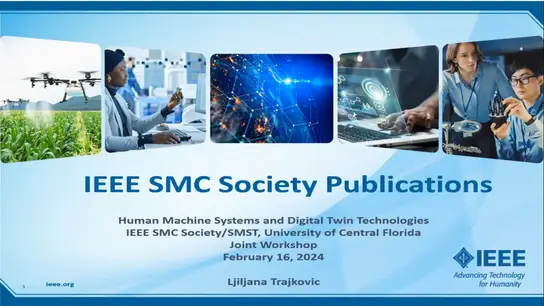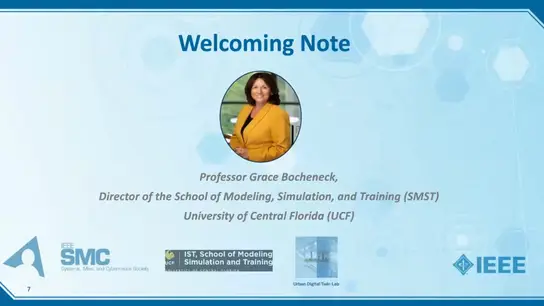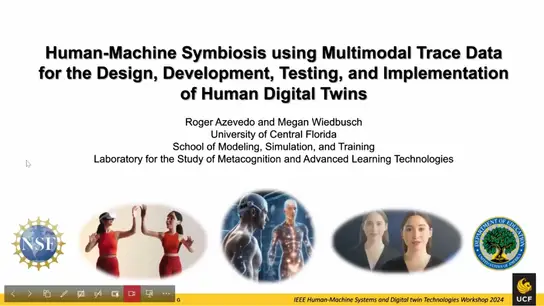-
Members: FreeSMCS
IEEE Members: $11.00
Non-members: $15.00Length: 00:17:14
16 Feb 2024
Robot Team Establishment using E-CARGO/RBC
Professor Haibin Zhu, Department of Computer Science and Mathematics, Nipissing University, Canada
Description automatically generated with medium confidence DR. Haibin Zhu is a Full Professor and the Coordinator of the Computer Science Program, the Founding Director of the Collaborative Systems Laboratory, a member of the Senate Research Committee, Arts and Science Executive Committee, Nipissing University, Canada. He is also an affiliate full professor at Concordia Univ. and an adjunct professor of Laurentian Univ., Canada. He has accomplished (published or in press) over 240+ research works, including 40+ IEEE Transactions articles, six books, five book chapters, four journal issues, and four conference proceedings. He is a fellow of I2CICC (International Institute of Cognitive Informatics and Cognitive Computing), a senior member of ACM and IEEE, a full member of Sigma Xi, and a life member of CAST-USA (Chinese Association of Science and Technology, USA).
He is serving as Vice President - Systems Science and Engineering (SSE) (2023-), member-at-large of the Board of Governors (2022-), and a co-chair (2006-) of the technical committee of Distributed Intelligent Systems of IEEE Systems, Man and Cybernetics (SMC) Society (SMCS). Associate Editor (AE) of IEEE Transactions on SMC: Systems (2018-), IEEE Transactions on Computational Social Systems(2018-), Frontiers of Computer Science (2021-), and IEEE Canada Review (2017-). He served as Editor-in-Chief of IEEE SMC Magazine (2022), AE of IEEE SMC Magazine (2015-2021), Associate Vice President (AVP), SSE (2021), IEEE SMCS, Program (Co-)Chair for many international conferences, and PC member for 130+ academic conferences.
He is the founding researcher of Role-Based Collaboration and Adaptive Collaboration and the creator of the E-CARGO model. His research monograph E-CARGO and Role-Based Collaboration can be found at https://www.amazon.com/CARGO-Role-Based-Collaboration-Modeling-Problems/dp/1119693063. The accompanying codes can be downloaded from GitHub: https://github.com/haibinnipissing/E-CARGO-Codes. He has offered 30+ keynote speeches for international conferences and 90+ invited talks internationally. He has received over CAD$1M of grants from SSHRC, NSERC, IBM, DNDC, DRDC, and OPIC.
Abstract:
Hybrid Human/Robot teams are systems that include both humans and highly autonomous robots and they can be used in a wide range of applications, including surveillance, inspection, rescue, automation, and logistics. To establish such a hybrid team, the collaboration between agents in the team can quickly become a challenging problem, particularly when there is a dynamic environment including a variety of well-trained humans with different expertise, and robots with various hardware, software, battery life, size, and functionalities. Hybrid team establishment introduces new requirements, new challenges, and new solutions to real-world problems. When many heterogeneous and autonomous robots and humans are organized as a team to accomplish a mission, evaluating each human/robot for each task and assigning proper tasks to each human/robot before acting is essential. Pertinent and dynamic task assignments can avoid failures in operation and increase operating efficiency while the humans and robots are executing their mission. Role-Based Collaboration (RBC) is a computational methodology that uses role mechanisms to facilitate collaboration activities. RBC and its Environments - Classes, Agents, Roles, Groups, and Objects (E-CARGO) model have been developed into a powerful tool for investigating teamwork. Related research has brought and will bring exciting improvements to the development, evaluation, and management of systems, including collaboration, services, clouds, productions, and administration systems. E-CARGO/RBC has been verified by formalizing and solving significant problems in collaboration and complex systems, e.g., Group Role Assignment (GRA). With the help of E-CARGO, the methodology of RBC can be applied to solve various real-world problems. E-CARGO itself can be extended to formalize abstract problems as innovative investigations in research. In this presentation, we examine the requirement of research on robot teams and collaboration, discuss RBC and its model E-CARGO; review the related research achievements on RBC and E-CARGO in the past years, including Group Role Assignment (GRA), GRA with Constraints (GRA+), and Adaptive Collaboration; analyze their connections with hybrid teams, and present initial simulations and experiments. The presenter welcomes queries, reviews, studies, applications, and criticisms.


